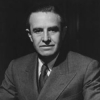W. Averell Harriman

W. Averell Harriman
William Averell Harrimanwas an American Democratic politician, businessman, and diplomat. He was the son of railroad baron E. H. Harriman. He served as Secretary of Commerce under President Harry S. Truman and later as the 48th Governor of New York. He was a candidate for the Democratic presidential nomination in 1952, and again in 1956 when he was endorsed by President Truman but lost to Adlai Stevenson both times...
NationalityAmerican
ProfessionPolitician
Date of Birth15 November 1891
CountryUnited States of America
This was the period when I used all the influence I had to get the British to abandon their export trade, and as much as possible convert all of their manufacturing facilities to the immediate needs of the war, including civilian, as well as military requirements.
We became convinced that, regardless of Stalin's awful brutality and his reign of terror, he was a great war leader. Without Stalin, they never would have held.
Yet the whole preamble of the second authorization act for the Marshall Plan showed the direction Congress was ready to take about breaking down barriers within Europe.
The Russians often took advantage of Lend-Lease.
As far as the Russians were concerned, I felt the reverse; they had adequate gold, if they wanted to buy, and they weren't dependent upon international trade. I felt they were more self-sufficient.
The Russians obtained a number of plants under Lend-Lease, which had been authorized by Washington, that I thought were not justified for their war effort. They wanted them for postwar use.
Conferences at the top level are always courteous. Name-calling is left to the foreign ministers.
The war changed everybody's attitude. We became international almost overnight.
There's a myth that Roosevelt gave Stalin Eastern Europe. I was with Roosevelt every day at Yalta.
Roosevelt was the one who had the vision to change our policy from isolationism to world leadership. That was a terrific revolution. Our country's never been the same since.
It never occurred to me that we would have as grandiose a program as the Marshall Plan, but I felt that we had to do something to save Europe from economic disaster which would encourage the Communist takeover.
Actually I'd had a certain amount of experience in Europe in the inter-war period, as a banker, and I was also a member of the Board of Directors of the International Chamber of Commerce.
No foreign policy will stick unless the American people are behind it. And unless Congress understands it. And unless Congress understands it, the American people aren't going to understand it.
Americans wanted to settle all our difficulties with Russia and then go to the movies and drink Coke.